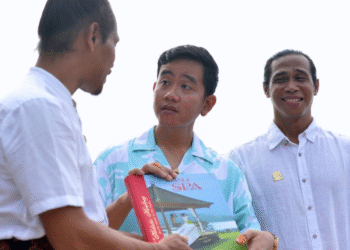Checkpapuanow.com – Three inmates convicted for raising the Morning Star flag — a symbol often associated with the Papuan independence movement — have been granted presidential amnesty. The announcement was confirmed by Acting Head of Class I Makassar Penitentiary, Novian Endus Santoso.
The decision marks a significant development in President Prabowo Subianto’s early administration. The three individuals were serving sentences after being found guilty of participating in a prohibited political demonstration. Their release was made possible following a formal grant of amnesty by the President, in line with constitutional provisions.
According to Novian, the pardon was not merely a legal formality but also a recognition of the inmates’ efforts to rehabilitate and reintegrate into society. “This amnesty reflects the government’s appreciation for their commitment to self-improvement during incarceration,” he stated.
The three former prisoners had reportedly demonstrated good behavior during their time behind bars. They also engaged in various rehabilitation programs, which became one of the primary considerations in the evaluation process. While details regarding the exact timing and conditions of their release were not disclosed, authorities confirmed that the amnesty followed thorough administrative and legal procedures.
This latest development has sparked discussions across the country, especially regarding the broader implications of granting political pardons. While some see it as a step toward reconciliation in Papua, others remain cautious about its potential impact on national unity and legal consistency.
Legal analysts argue that amnesty is a prerogative of the president, but its implementation must be balanced with national interest. In this case, the decision aligns with Indonesia’s broader goals of peace-building in conflict-prone regions, including Papua.
Human rights groups have long called for more humane treatment of political prisoners. They view the release as a positive gesture that could pave the way for dialogue between the central government and communities in Papua. However, they also emphasize the need for systemic reform to prevent further criminalization of peaceful expression.
In recent years, cases involving the Morning Star flag have drawn international attention. The act of raising the flag is often interpreted by Indonesian authorities as a violation of national law, given its association with separatist sentiment. However, advocates for civil liberties argue that such actions fall under the right to freedom of expression.
The release of the three individuals comes at a politically sensitive time, as the new administration seeks to demonstrate both strength and compassion. Observers note that while the gesture may be viewed as progressive, it will require consistent policy follow-ups to maintain public trust and ensure legal clarity.
For now, the presidential amnesty has brought a measure of relief to the families of the former prisoners, who have awaited their return for years. As the country watches closely, the decision may set a precedent for future cases involving political expression and national reconciliation.














